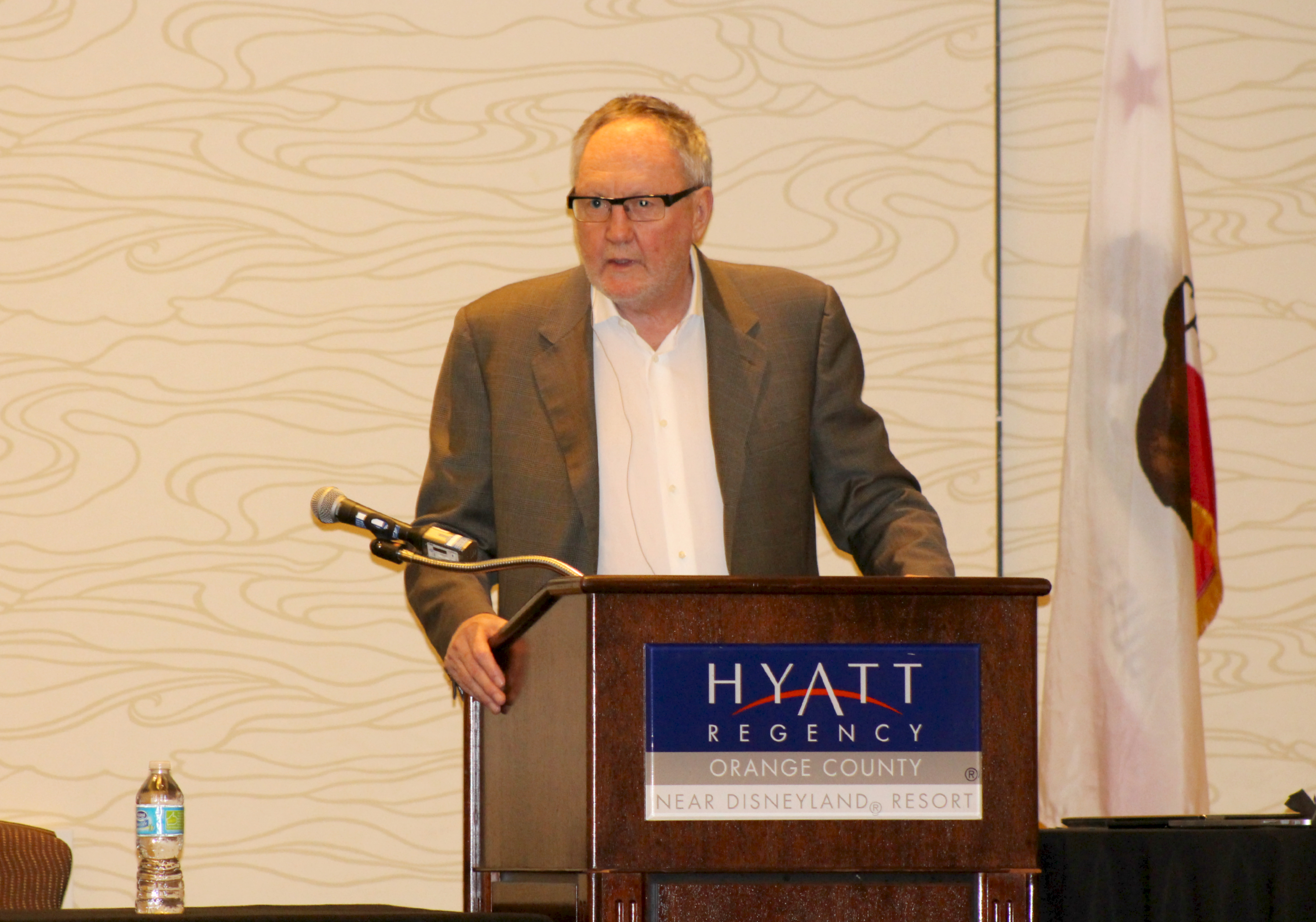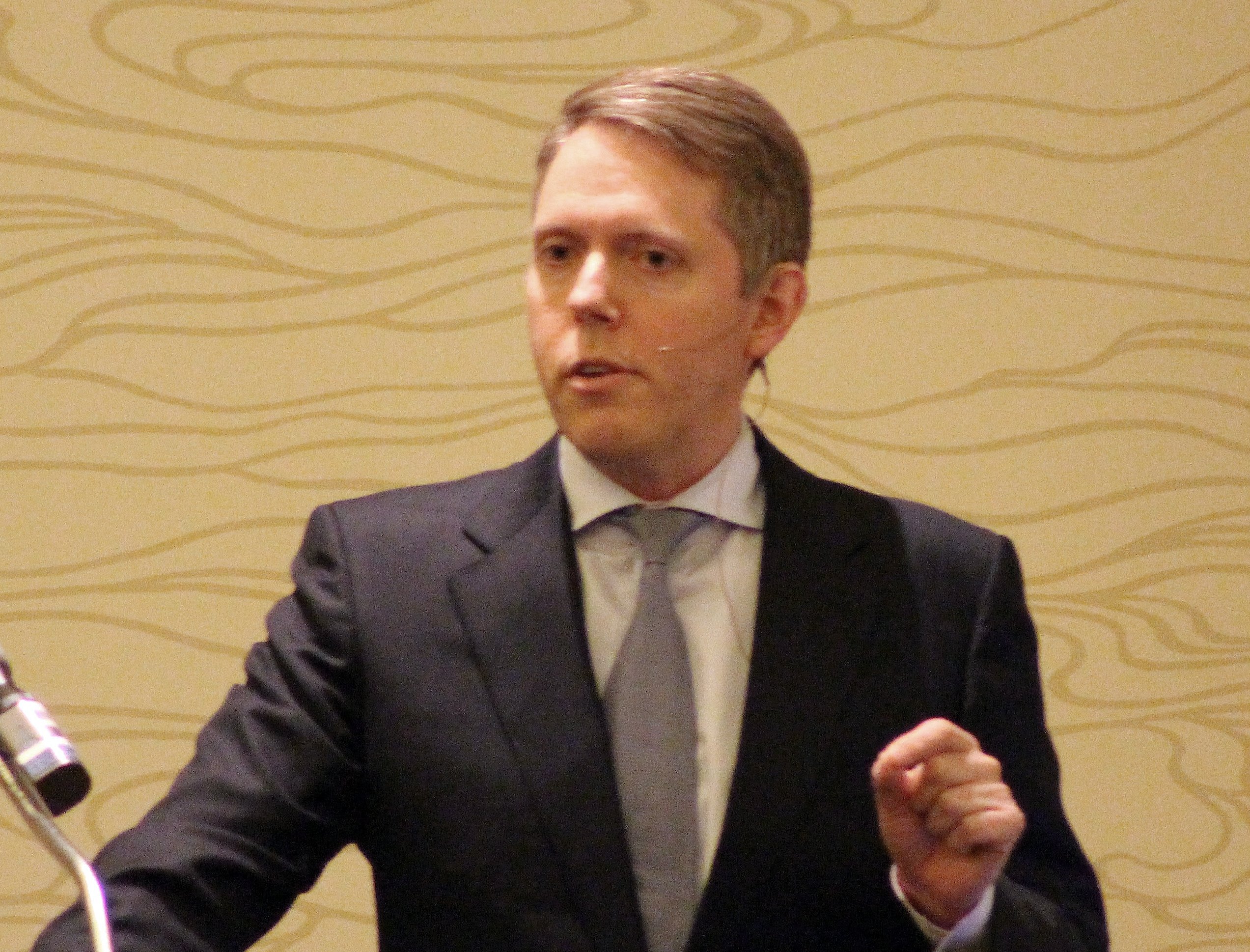Renowned education reform expert Michael Fullan says two things matter most in changing the culture of a school or district — the ability to shape and reshape quality ideas, and the ability to build capacity and ownership around those ideas.
 “If you have one without the other, you don’t get anything,” he said.
“If you have one without the other, you don’t get anything,” he said.
Fullan, a professor emeritus at the University of Toronto’s Ontario Institute for Studies in Education and the author of more than 30 books, was the keynote speaker at OCDE’s “Equipping an Emerging Generation” conference at the Hyatt Regency Orange County on Tuesday, May 19. Hosted by county Superintendent of Schools Dr. Al Mijares and sponsored by SchoolsFirst Federal Credit Union, the event also featured Trevor Packer, senior vice president for the College Board.
Fullan has advised policymakers around the world and is widely recognized for his role in transforming the school system in Ontario, Canada. In recent years, he’s been recruited to help bring similar reforms to California. Speaking to more than 400 educators and business leaders from Orange County and beyond, he said there’s a very real opportunity to bring meaningful change to schools in the golden state.
The key, according to Fullan, is to foster collaboration, allow educators a chance to develop, focus on a specific agenda and avoid being judgmental, particularly in the early stages. Talented teachers are a necessary ingredient, he said, but research indicates effective collaboration is an even bigger driver of high academic achievement.
“Collective efficacy of a group of teachers has more impact on student learning than individual things,” he said. “It makes sense when you put it together. This is why we work so much on changing the culture of schools and the culture of districts. That is really where the power lies.”
Student enthusiasm also plays a role, yet surveys show a consistent decline in enthusiasm with each passing grade level. To turn that around, Fullan said schools must strive to make learning engaging, ensure technology is accessible and easy to use, and offer lessons steeped in real-life problem-solving.
“This is fundamental to how learning should happen in the 21st century,” he said.
As for the role of principals, Fullan believes they should avoid becoming micromanagers and instead view themselves as the “lead learners” at their campuses, meaning they pursue professional growth as they build capacity.
“The main mark of a good leader, whether it’s a superintendent of a principal, is that they work five, six, seven years or so in a given jurisdiction, and they build collaborative cultures to the point where they, themselves, become dispensable,” he said.
 In his presentation, Packer — he’s pictured to the right — said his role in developing and managing the Advanced Placement program for the College Board has prompted him to question whether tests appropriately reflect and reinforce instructional rigor. Too often, he said, school exams require memorization rather than thoughtful analysis. He cited an older AP biology test question that asked students to identify the term for “the creeping horizontal and subterranean stems of ferns.” (Google tells us the answer is “rhizomes.”)
In his presentation, Packer — he’s pictured to the right — said his role in developing and managing the Advanced Placement program for the College Board has prompted him to question whether tests appropriately reflect and reinforce instructional rigor. Too often, he said, school exams require memorization rather than thoughtful analysis. He cited an older AP biology test question that asked students to identify the term for “the creeping horizontal and subterranean stems of ferns.” (Google tells us the answer is “rhizomes.”)
“If teachers see lots of questions like this on tests, what do they do? They cram, they lecture, they cover as much material as possible because you don’t know what micro-fact, what minute piece of data, is going to show up on a test,” he said.
As part of a landmark redesign of AP courses and tests, Packer said the College Board worked with cognitive scientists in each discipline to determine what practices and skills would best indicate a student is prepared to be successful in college. As a result, newer questions blend content with an associated task. For example, students might be asked to create a diagram showing how nervous systems transmit information.
Similarly, an older version of the AP U.S. history exam asked this multiple-choice question: “Which of the following colonies required each community of 50 or more families to provide a teacher of reading and writing?”
“Do any of you know the answer to that?”, Packer rhetorically asked the audience. “Yeah, why should you, right? And yet we’re all functioning adults. Somehow we were all able to succeed in college without knowing this.”
Those types of questions send the message that teachers and students should focus on memorizing random facts, he said.
So a recent overhaul of the AP test in U.S. history doubled the number of questions that require student writing and replaced 80 multiple-choice questions with 55 prompts asking students to analyze primary and secondary sources. The new version, for example, might ask students to decide which of three dates marks the beginning of the United States as a world power — and explain why.
Packer said college should continue to be encouraged as a path for students who are at risk or on the bubble, pointing to studies that show higher education has a dramatic impact on their futures. He also noted that courses fostering critical-thinking have become somewhat politicized in recent years, and he called on educators to stand up for challenging coursework.
Dr. Mijares, the county superintendent, kicked off the conference by discussing recent budget news out of Sacramento, where proposition 98 revenues are expected to hit an all-time high of $68.4 billion.
“These are most certainly improved fiscal times,” he said. “However, with these resources comes enormous accountability. That’s why the Orange County Department of Education created the highest vision for our work: Orange County students will lead the nation in college and career readiness and success.”
At the same time, he acknowledged that local demographics are increasingly posing new challenges for educators. Mijares said half of Orange County’s students are eligible for subsidized lunches based on their families’ income levels, and 24 percent are English-learners who speak nearly 60 languages.
The superintendent encouraged attendees to read author Robert D. Putnam’s new book, “Our Kids: The American Dream in Crisis.”
“I love it that (Putnam) says ‘Our Kids,’” Mijares told attendees. “These aren’t somebody else’s kids; these are our kids. And he writes about the opportunity gap, because with the achievement gap comes an opportunity gap … and that gap is wholly tied to education. In fact, all major indices of social dysfunction are tied to education.”
